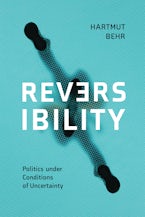"This book is an impressive achievement. It guides the reader with clarity and confidence in outlining a concept of reversibility that skilfully combines theoretical nuance with policy relevance." Magdalena Zolkos, University of Jyväskylä
"As we live in a world of increasing precariousness, a study on the kind of politics to respond to it is necessary if we, humans of the Anthropocene, have any intention to survive. In Hartmut Behr's book we are not disappointed. We receive guidance through a masterpiece of practical wisdom. This book addresses the fundamental experience everyone in this world has: It is a world of uncertainties. And this is a book for political practice in the sophisticated way it develops the concept of reversibility – responsible political actions should be taken in such a way that their consequences are reversible. Behr has nourished his study with an impressive number of theoretical reflections, for which he has drawn on a wide array of literature and, in particular, a well-chosen set of philosophical and literary authorities. It is in our common interest that this book should receive far-reaching attention." Tilo Schabert, University of Erlangen-Nuremberg
"Policymakers and scholars alike are having to come to grips with the condition of uncertainty and unpredictability. When climate change and other complex challenges render the world around us seemingly uncontrollable, how should we respond politically and ethically? Behr's timely intervention tackles this question head on, suggesting a new set of ethical principles around reversibility for policy and political action. This book is essential reading for all seeking to develop policy and politics in an uncertain world." Milja Kurki, Aberystwyth University
"Behr tackles a fundamental dilemma of human existence: we must act but we cannot know the future and therefore the consequences of our actions. How ought we to respond to this troubling uncertainty in an ethical and politically efficacious way? We must do our best to avoid actions whose consequences are likely to be irreversible. This ethical commitment is defended in a convincing manner and its implications for policy explored in a sophisticated and imaginative way." Ned Lebow, Dartmouth College and King's College, London
"Against the deterministic assumptions of rationalism, Reversibility – Politics under Conditions of Uncertainty presents a groundbreaking argument that takes us from the characteristics of the human condition through to their implications for thinking and acting in a non-linear, contingent world. The book is a tour de force of passionate philosophical thinking, but more importantly a deeply persuasive account of how we need to think, judge and act beyond and through the human in the Anthropocene." Kimberly Hutchings, Queen Mary University of London

